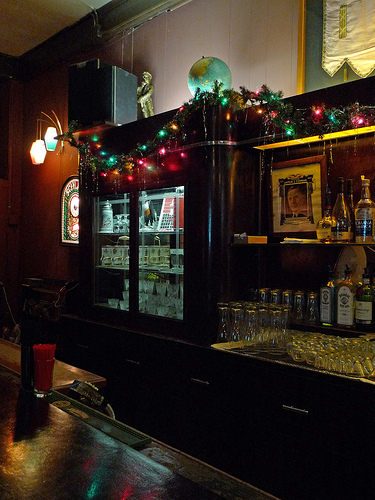Remembering That Time Chicago's Mayor Took A Bullet For A President
By Steven Pate in Arts & Entertainment on Feb 15, 2012 9:40PM
 Image Credit: Curtis Locke
Image Credit: Curtis Locke
Today marks the 79th anniversary of a moment that forever changed the history of Chicago and one of the very great "What If" stories of American history.
At 9:15 p.m. on Feb. 15, 1933, in Miami's Bayfront Park, an assassin's bullet intended for then president-elect Franklin Delano Roosevelt veered off course and struck the Mayor of Chicago, Anton "Tony" Cermak, in the lung. The champion of the New Deal was spared, the father of the Democratic machine, who had definitively wrested control of the city from the hands of William Hale Thompson's Republican grasp. Cermak famously told Roosevelt "I'm glad it was me instead of you."
Since we first saw that quote, attached to a portrait of the mayor hanging behind the bar at The Skylark (located, not coincidentally, on the street renamed for the fallen mayor), we have been fascinated by the story. The gunman, a feisty diminutive Italian immigrant named Giuseppe Zangara had to stand on a chair to draw a bead on his target, and only got one good shot off from his cheap pawn shop pistol before being wrestled to the ground, firing wildly. He was defiant and practically unhinged until his end, which arrived rather swiftly once Cermak died two days after Roosevelt's inauguration on March 6. In fact, even though the 14-days it took to go from murder charge to electric chare was the most rapid legal execution of the 20th century, it was somehow long enough to engender the term "death row," as the prison was forced to accommodate two murderers awaiting death sentences at once for the first time.
Any political assassination is fertile ground for conspiracy theorists, and there have always been those who claimed that Cermak was the intended target and that the murder was reprisal for Cermak's police hit on the Chicago Outfit's Frank Nitti. What isn't up for debate is that the Democratic machine Cermak assembled was here to stay (there haven't been any Republican mayors--or assassinated ones--since).
The story was good enough to inspire a couple of movies, and a treatment from Stephen Sondheim, but it remains remarkable for having been a cinematic event itself: